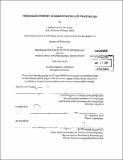| dc.contributor.advisor | Phoebe J. Lam. | en_US |
| dc.contributor.author | Ohnemus, Daniel Chester | en_US |
| dc.contributor.other | Woods Hole Oceanographic Institution. | en_US |
| dc.date.accessioned | 2014-05-23T19:40:08Z | |
| dc.date.available | 2014-05-23T19:40:08Z | |
| dc.date.copyright | 2014 | en_US |
| dc.date.issued | 2014 | en_US |
| dc.identifier.uri | http://hdl.handle.net/1721.1/87512 | |
| dc.description | Thesis: Ph. D., Joint Program in Chemical Oceanography (Massachusetts Institute of Technology, Department of Earth, Atmospheric, and Planetary Sciences; and the Woods Hole Oceanographic Institution), 2014. | en_US |
| dc.description | Cataloged from PDF version of thesis. | en_US |
| dc.description | Includes bibliographical references. | en_US |
| dc.description.abstract | Marine particles include all living and non-living solid components of seawater, representing an extremely dynamic and chemically diverse mixture of phases. The distributions of these phases are poorly constrained and undersampled in the oceans, despite interactions between living organisms and non-living minerals having central roles within many globally relevant biogeochemical processes. Through a combination of method development, basin-scale particulate collection and analyses, modeling, and field experiments, this thesis examines both the distributions of marine particulate trace metals and the underlying processes-inputs, scavenging, vertical and horizontal transport, and biotic uptake-in which marine particles participate. I first present the results of an intercalibration exercise among several US laboratories that analyzed filtered particles on shared polyethersulfone filters. We use inter-lab and intra-lab total elemental recoveries of these particles to determine our state of our intercalibration (</= 21% one-sigma inter-lab uncertainty for most elements; 9% intra-lab) and to identify means of future improvement. We also present a new chemical method for complete dissolution of polyethersulfone filters and compare it to other total particle digestion procedures. I then present the marine particulate distributions of the lithogenic elements Al, Fe, and Ti in the North Atlantic GEOTRACES section. Inputs of lithogenic particles from African dust sources, hydrothermal systems, benthic nepheloid layers and laterally-sourced margin influences are observed and discussed. Lithogenic particle residence times, size-fractionation patterns, Ti-mineral speciation, and relationships to biological aggregation processes are calculated and described. A one-dimensional, size-fractionated, multi-box model that describes lithogenic particle distributions is also proposed and its parameter sensitivities and potential implications are discussed. The thesis concludes with the presentation of results from a series of bottle incubations in naturally iron-limited waters using isotopically labeled Fe-minerals. We demonstrate both biotic and abiotic solubilization of the minerals ferrihydrite and fayalite via transfer of isotopic label into suspended particles. These results are the first of their kind to demonstrate that minerals can be a source of bioavailable iron to euphotic communities and that spatial and ecological variations in mineral Fe-bioavailability may exist. | en_US |
| dc.description.statementofresponsibility | by Daniel Chester Ohnemus. | en_US |
| dc.format.extent | 180 pages | en_US |
| dc.language.iso | eng | en_US |
| dc.publisher | Massachusetts Institute of Technology | en_US |
| dc.rights | M.I.T. theses are protected by copyright. They may be viewed from this source for any purpose, but reproduction or distribution in any format is prohibited without written permission. See provided URL for inquiries about permission. | en_US |
| dc.rights.uri | http://dspace.mit.edu/handle/1721.1/7582 | en_US |
| dc.subject | Joint Program in Chemical Oceanography. | en_US |
| dc.subject | Earth, Atmospheric, and Planetary Sciences. | en_US |
| dc.subject | Woods Hole Oceanographic Institution. | en_US |
| dc.title | The biogeochemistry of marine particulate trace metals | en_US |
| dc.type | Thesis | en_US |
| dc.description.degree | Ph. D. | en_US |
| dc.contributor.department | Joint Program in Chemical Oceanography | en_US |
| dc.contributor.department | Woods Hole Oceanographic Institution | en_US |
| dc.contributor.department | Massachusetts Institute of Technology. Department of Earth, Atmospheric, and Planetary Sciences | |
| dc.identifier.oclc | 879674058 | en_US |
